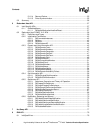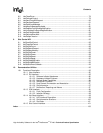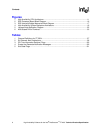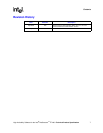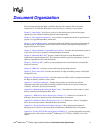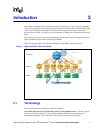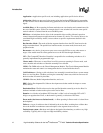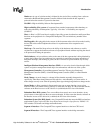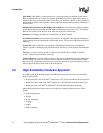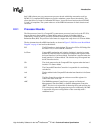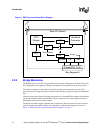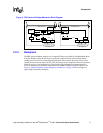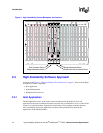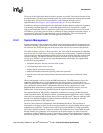
12 High Availability Software for the Intel
®
NetStructure
TM
ZT 4901 Technical Product Specification
Introduction
Application—Application-specific code, not including application-specific device drivers.
Arbitration—Hardware process of a bus master using the hardware REQ# signal to request the
PCI bus from the Active Host and then being granted access to the bus with the hardware GNT#
signal.
Available Host—A Host operating in Owner mode that can own domains and communicate with
the rest of the RH system. A Host, for example, that it is not switched off or not in some special
mode in which it is isolated from the rest of the RH system.
BP Driver—A backplane device driver is the executable object residing in kernel space that
controls interaction between an application and an instance of a device. For a device driver to be
considered High Availability Aware, it must conform to specific requirements detailed in this
document.
Bus Interface Mode—The mode of the bus segment interface from the CPU base board or the
bridge mezzanine board. The possible bus interface modes are owner mode, drone mode, and
peripheral mode.
Bus master—Any device given peer-to-peer access across the PCI bus to any other master or
target. A bus master must have been granted access to the PCI bus through arbitration.
CIC—The CompactPCI Interface Controller is responsible for coordinating switchovers. It is
generally implemented in programmable logic.
Cluster mode—When two or more Hosts in an HA system are operating in Cluster mode, each
owns a domain and switchover of domain ownership is not allowed.
CMM—The CMM refers to the Chassis Management Module. The Chassis Management Module
maintains the status and control over management devices located inside the chassis.
Cold Switchover— During a cold switchover, bus ownership is transferred from a system master
Host to a receiving Host. The Host receiving bus ownership is then reset, which in turn resets all
the devices that are owned by that Host.
COMM—Ethernet, Media Independent Interface, and so on.
DDK—Driver Development Kit. Software development tools that enable developers to create
device drivers.
Destination Host—The Host that receives the specified domains owned by an Active Host if a
hardware-initiated switchover takes place on the Active Host.
Domain—A collection of peripheral PCI slots that is a Host’s unit of ownership. PCI-to-PCI
bridges can populate these slots, so the domain is generally a collection of PCI trees.
Drone mode (also known as Isolated mode)—A Host operating in Drone mode is isolated from
the backplane.
Failover—A type of switchover that is initiated by the Active Host, resulting from a failure that
leaves the domain in an unknown state and requires a bus segment reset to recover.
Fault-tolerant system—Hardware and software designed with redundancy to achieve very high
availability. Typically this is a high-cost High Availability solution.



